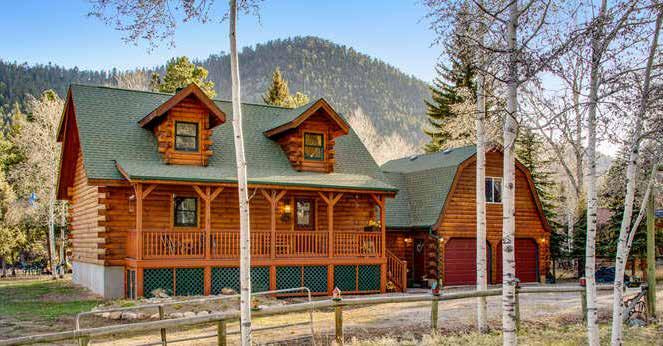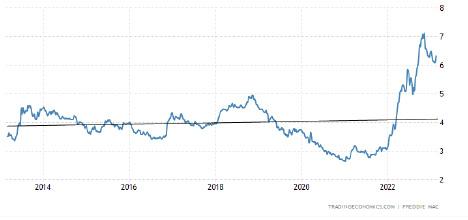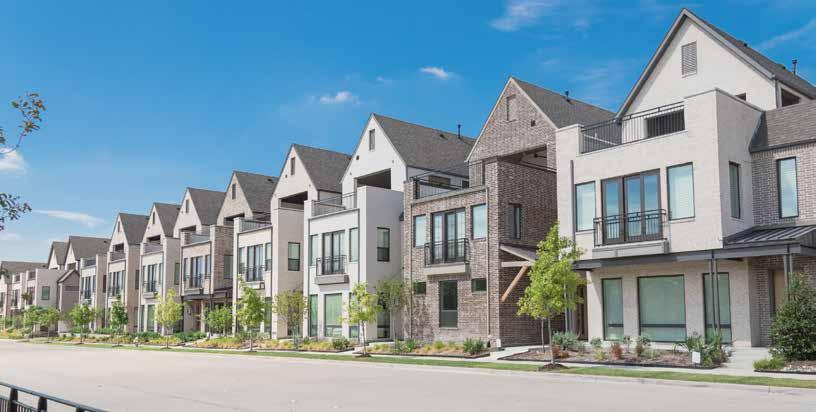
Angie Spangler
CLHMS, CRS, CNE, Green Designation

Cell: 970-402-6430
O ce: 970-482-1781
angiespangler@remax.net

Brian Lantis
Cell: 970-799-9468
O ce: 970-482-1781
brianlantis@remax.net



Angie Spangler
CLHMS, CRS, CNE, Green Designation

Cell: 970-402-6430
O ce: 970-482-1781
angiespangler@remax.net

Brian Lantis
Cell: 970-799-9468
O ce: 970-482-1781
brianlantis@remax.net

FortCollinsRealEstateByAngie.com





Representing Sellers and Buyers in Northern Colorado since 2001!
• Angie is a Certified Residential Specialist, Certified Luxury Home Marketing Specialist, Certified Negotiation Expert and Green Designee.
• Angie and Brian advocate for Sellers and Buyers working in their best interests.

• Angie and Brian live in Old Town Fort Collins and service all of Fort Collins and Northern Colorado.













FEATURE
To
supply than a balanced market would have. Other challenges in this year’s market include fluctuations in interest rates and unstable pricing.
FEATURE
Home buying in the new era—How mortgages can still be affordable
Although the market is quite different than it was a year or two ago, there are still great ways you can purchase a home. Explore the options for getting the best mortgage for your homebuying needs.


PUBLISHERS
Greg Hoffman greg.rmpublishing@gmail.com
Scott Titterington scott.rmpublishing@gmail.com


EDITOR
Kristin Titterington kristin.rmpublishing@gmail.com
CREATIVE DIRECTOR
Emily Zaynard emily.rmpublishing@gmail.com
ADVERTISING SALES DIRECTOR
Greg Hoffman greg.rmpublishing@gmail.com
Distribution manager Susan Harting

COVER PHOTO iStock Photo

CONTRIBUTING WRITERS
Lea Hanson, Katie Harris Linda L. Osmundson Scott Titterington
ROCKY MOUNTAIN PUBLISHING
PO Box 740, Fort Collins, CO 80522 (970) 221-9210 www.RMPublish.com
Northern Colorado Home Buyers Guide 2023 is a special publication of Rocky Mountain Publishing, Inc. Publication of this magazine does not constitute an endorsement of the products or services advertised. RMP reserves the right to refuse any advertisement for any reason. The opinions expressed by contributors or writers do not necessarily reflect the opinions of Rocky Mountain Publishing.
©2023 Rocky Mountain Publishing, Inc. All rightsreserved. Reproduction without express written permission is prohibited.





planning stages and plan to include another 30 units.
The first Colorado Senate bill SB23-001 was introduced right away in 2023. If passed, the land will serve as the proof of concept for a new pathway to building affordable housing in the state. The public-private collaboration unit in the department of personnel (department) promotes the use of publicprivate partnerships between state public entities such as departments, agencies, or subdivisions of the executive branch of state government, and private partners as a tool for time and cost-efficient completion of public projects. The bill also allows the department and the unit to use money from the fund to facilitate these additional functions by the unit in connection with public projects that provide housing
and for the standard operating expenses of the unit.
Read the bill in full here: https://leg.colorado.gov/bills/ sb23-001
High Plains Housing Development Corporation, a nonprofit developer, is in the early stages of bringing more than 175 affordable housing units to north Greeley with new construction and by renovating and repurposing three former produce assembly and storage buildings next to the Rodarte Community Center. This nonprofit organization works to prevent community deterioration in low income areas, and to assist lowto-moderate income individuals and families through affordable housing development strategies.
Their current project is the North Weld Village in Greeley. After a generous donation of a 6.5-acre industrial property at 123 9th Avenue in Greeley from a local philanthropist, the organization is developing permanent housing solutions for the homeless in the
While most community land trusts are concentrated in a single neighborhood, Elevation CLT has the flexibility to serve any community in Colorado where families are at risk of displacement. ECLT makes homeownership more accessible for Colorado families through the community land trust model, a proven tool for creating and preserving accessible, inclusive communities for generations. ECLT is focused on acquiring or developing 700 permanently affordable homes and serving approximately 2,000 residents in its first five years—making it one of the largest CLTs in Colorado and
community through the adaptive re-use of the property for affordable housing.
Additional phases of the project are still in the early
the country. Learn more, review FAQs, and see the application and qualification process online at https://www.elevationclt.org/.

In Spring of 2020, The Federal Reserve began to purchase Mortgage-Backed Securities (Mortgage Bonds) at an unprecedented level. This caused the price of Mortgage bonds to increased and mortgage rates to decrease. The sub-3% rates seen in 2020 and 2021 were due to this large purchase spree. Good Stuff right!?
In Spring of 2020, The Federal Reserve began to purchase Mortgage-Backed Securities (Mortgage Bonds) at an unprecedented level. This caused the price of Mortgage bonds to increased and mortgage rates to decrease. The sub-3% rates seen in 2020 and 2021 were due to this large purchase spree. Good Stuff right!?
Due to the large amount of money
Due to the large amount of money
created in order to purchase the mortgage bonds, inflation began to creep up in Fall of 2021. The Fed announced that not only would they step back the amount of bond purchased they also plan to sell their holdings. This caused mortgage bond prices to fall, and mortgage rates to increase.
created in order to purchase the mortgage bonds, inflation began to creep up in Fall of 2021. The Fed announced that not only would they step back the amount of bond purchased they also plan to sell their holdings. This caused mortgage bond prices to fall, and mortgage rates to increase.
The Federal Reserve
The Federal Reserve’s primary focus is combating inflation. Rates were
The Federal Reserve’s primary focus is combating inflation. Rates were
historically low in 2020 and 2021, and due to the factors that created that environment, inflation began to increase. As a result, the Fed began to hike their Fed Funds Rate, which is a short term rate for overnight trading between banks. The Fed Funds Rate DOES NOT DIRECTLY CORRELATE TO MORTGAGE RATES. It can influence them, but anytime the Fed “hikes rates” that doesn’t mean the mortgage rates are going up with them. It all boils down to what they want to see with inflation. As long as Inflation persists, mortgage rates will remain high.
historically low in 2020 and 2021, and due to the factors that created that environment, inflation began to increase. As a result, the Fed began to hike their Fed Funds Rate, which is a short term rate for overnight trading between banks. The Fed Funds Rate DOES NOT DIRECTLY CORRELATE TO MORTGAGE RATES. It can influence them, but anytime the Fed “hikes rates” that doesn’t mean the mortgage rates are going up with them. It all boils down to what they want to see with inflation. As long as Inflation persists, mortgage rates will remain high.


2023 will hopefully be more stable in the mortgage bond and interest rate market. Rates will come back down to the historical averages, in time. Looking at this graph, you can see where Mortgage Rates were prior to 2020. And they will find their way back there again! It’s just a matter of time.
2023 will hopefully be more stable in the mortgage bond and interest rate market. Rates will come back down to the historical averages, in time. Looking at this graph, you can see where Mortgage Rates were prior to 2020. And they will find their way back there again! It’s just a matter of time.


No, Higher Rates create less Buyers. That increases Buyer power. The historically low rates seen in 2020 and 2021 combined with low housing inventory created Seller Power and bidding wars. Buyers could borrow more, and sellers could ask for more. Homebuyers should be focused on what they can afford rather than what they can qualify for. Either you buy a house and lock into a 30 year fixed rate before they go higher, OR they come down and you refinance into a lower rate. Those willing to accept the current rates have more power than those who bought a house when rates were low.
No, Higher Rates create less Buyers. That increases Buyer power. The historically low rates seen in 2020 and 2021 combined with low housing inventory created Seller Power and bidding wars. Buyers could borrow more, and sellers could ask for more. Homebuyers should be focused on what they can afford rather than what they can qualify for. Either you buy a house and lock into a 30 year fixed rate before they go higher, OR they come down and you refinance into a lower rate. Those willing to accept the current rates have more power than those who bought a house when rates were low.


A

FOR SALE SIGNS seem to be showing up a little more in my neighborhood than a year ago when there were zero. So, does that mean that it’s going to be easier to buy a house now? Well, maybe, but it’s still going to be a challenging year for home buyers.
The bright spot is that active listings are up 75 percent over a year ago in Fort Collins and 50 percent in Weld County. That glow is dimmed though when we consider that there is only a 1.5-month supply (how many available vs. how many selling) of houses. A balanced market has a 4- to 6-month supply, so it’s still going to be frustrating for buyers to find the right house.
“Before, when I had buyers, there used to be 20 houses that fit for them,” says Eric Kronwall of RE/MAX Advanced. “Now you might have to wait a few weeks to see one house that meets your requirements.”

challenging year ahead for buyersScott Titterington
The best houses will sell quickly and may have competing offers. You may have to act quickly to land the house you want in your price range, according to the Real Estate Insider from The Group.
Future inventory looks tight also as builders slow their roll with challenges ranging from interest-rate increases to supply-chain issues to skilledlabor shortages.
And then there’s water. Water will be the biggest problem facing new developments and housing availability in the future, Kronwall says. Northern Colorado’s population is expected to double in the next 25 years, and water will become even more precious.
The cost of water has gone up substantially, which adds to the home price and makes new homes less attractive to buyers and developers.
Mortgage rate fluctuations continue to be a wild card in home buying right now. From a peak in late 2022 of more than 7 percent, rates have dropped into the mid-6s for a 30-year, fixed mortgage. Leading economists suggest that rates will level off at around 5.5 to 6 percent in the back half of the year, according to the Real Estate Insider from The Group.
“I think rates will continue to go up,” Kronwall says. “There is a ton of wishful thinking out there.”
In fact, recent fluctuations are leading some people in the industry to predict that rates
won’t drop until 2024.
Another challenge, Kronwall says, is that sellers have to figure out pricing. With fewer houses selling, it’s difficult to find like properties to compare to (comps), and pricing can be all over the place.
“There will be some great deals and some awful deals,” Kronwall says.
Pricing is expected to stabilize in the second half of the year as buyers and sellers adjust to the new realities of the market and mortgage rates.
The Real Estate Insider by The Group recommends that you don’t ponder what interest rates used to be and you look at what opportunities might be available to you now.
Kronwall sees a couple of opportunities for buyers: problem houses and highend houses. For a problem house, the typical discount that buyers could ask for in less-desirable locations, such along a busy street, or houses that needed updates or repairs decreased or went away during the pandemic. That discount is going to return, Kronwall says. Purchasing a problem house requires imagination for buyers and a need to be realistic about capabilities and priorities.
As for high-end houses, supply and demand are more balanced with more high-end homes spending more time on the market. Increased interest rates might have had a larger effect on the sales of these homes.

KITCHEN
• Return of wood cabinetry and wood elements
• Warmer tones for paint or cabinets, blushbeige and Himalayan salt colors
• Darker stone and quartz countertops
• Induction cooktops and double appliances
• Full stone or single piece backsplash—no grout
BATHROOMS
• Clean, spa-like bathrooms with natural woods
• Light-colored tiles and warm paint tones
• Heated floors and towel racks
• No basic vanity lighting
• Sustainable materials
• Ensuite closets with custom built-ins and soft-close cabinets
• Organized storage—closed-up and not-open shelves
OTHER INTERIOR TRENDS
• Accent wall with art deco-inspired wallpaper and furniture
• Nature-inspired living spaces, live edges, large tree stumps for end tables
• Lighting from materials like rattan, rope, cane and wicker. Lighting is not an afterthought but a jewel in the house.
• Multiple study/workspace locations
• Butlers’ pantries and mudroom areas
• Spacious laundry rooms with storage and folding space
• Accent ceilings
• Statement front doors
• Wood or wood-look garage doors
• Hardwood, laminate-wood or porcelain-plank flooring
Most home buyers I work with want less driving and more walking – for work, dining, entertainment and more. That’s why more and more people are relocating to downtown areas. If you’re ready for downtown living in northern Colorado, call the Downtown specialist.





LIKE EVERYTHING ELSE, the mortgage industry was shaken up during the Covid years. Between a spike in remote employment leading to a higher demand for home office space and the Federal Reserve pushing interest rates artificially low beginning in 2020, the average lender was issuing twice as many mortgages by 2021 as in a typical year.
“I think if there’s anything that has shocked people,
both consumer and industry veterans alike, it’s the volatility that was injected into our market space and how quickly things changed,” says Cornerstone Mortgage’s Fort Collins Branch Manager, Justin Smith.
And while we’ve all heard the saying, what goes up must go down, in this case we’re witnessing the opposite effect take place, as those historically low Covid-era interest rates climb steadily back up to more
than double what they were just a year ago.
Rates on the rise
Marc Erickson, Branch Manager at Better Rate Mortgages, says the rate hike shouldn’t come as a surprise.
“Low rates were nice, but must be paid back somehow, which is what we’re seeing in the present,” he says. “Now, with higher rates, buyers are in shorter supply, housing prices are coming down, and buyers
have the power back.”
That’s good news for potential home buyers worried that the window to affordability closed with the rate increase. In fact, according to Smith, sellers are more motivated than ever to help with affordability by offsetting closing costs.

Motivated sellers plus creative lenders equals good news for buyers
“Seller concessions are becoming more popular,” says Smith. “These vary by situation: whether the house is priced well, how long it’s been on the market, and whether or not any deferred maintenance is required will dictate what the seller might be willing to do.”
Sellers aren’t the only ones finding ways to keep the
How mortgages can still be affordable
Katie Harris
market strong. Lenders have begun revisiting creative ways to make mortgages more attractive to buyers.
“The idea of buying the rate down is something we are seeing a lot of lately,” says Smith. “These products were almost unheard of a year ago. Today 90 percent of new loans contain some sort of buydown program, and it’s often the seller paying that fee.”
Temporary rate buydowns have become a particularly enticing option for buyers willing to take a bit of a gamble. These products allow buyers to use seller concessions to buy down their interest rate for the short term, before locking into a higher, fixed rate after a set amount of time. The assumption is that interest rates will drop enough in the first couple years post-loan origination to make refinancing affordable before the fixed rate comes into play.
Another increasingly popular option, for first-time home buyers in particular, is the down payment assistance program, which allows them to purchase a home with a lower down payment. While this option sounds appealing, Erickson says buyers should exercise caution when considering it.
“Down payment assistance programs are great to get people in the house, but often come with baggage that can pop up down the road,” he says. “The grants often come in the form of a “silent

second” lien, which means you don’t actively pay back the down payment assistance, and it gets forgotten until you try to refinance, then shows up and can make or break the economics of a refinance.”
Erickson says the best way to avoid “quick fixes” that can hurt you later on is to work with a lender you trust, ask questions about costs and fees upfront, and avoid falling into the trap of believing there’s an easy way to obtain a mortgage.
“It’s important to remember that there is no such thing as “free money,” he says. “Often programs that are specific and presented in a bright light can have things sneak up in the future.”
It’s always a good time to buy At the end of the day,
Erickson says it’s important to remember that the rate you get today is not the rate you’ll be stuck with for the next 30 years.
“The average age of a 30-year fixed mortgage is only five to seven years,” he explained. “You will either sell the home, pay off the loan and buy a new one, or refinance within that time. Don’t get caught up in the short-term abnormality of the industry.”
And while we may never again see mortgage rates in the 2 to 3 percent range, Smith says rates that low aren’t necessary for a strong market.
“No one can say for certain if we’ve reached the peak, but professionals in the industry think we’re at least
very near it,” says Smith. “Rates have stabilized. I don’t think we’ll see rates get back to where they were a year ago, but something in the high fours or low fives is much more manageable and something we’ll get back to more than likely.”
When it comes down to it, buying a home is a good investment no matter when you buy.
“There’s no reason to even discuss, ‘Should I buy a house’,” says Smith. “The numbers are very clear that, in terms of a long-term wealth creation strategy, owning your own home is an integral part of that. Real estate is a tremendous wealth builder over the long-haul, and Northern Colorado is a very attractive place to live.”
wall is to mix matte and gloss paints in the same color. Try a checkerboard pattern or alternating stripes. The change in paint finish means light will bounce off in varying amounts, creating and interesting focal point on an otherwise plain wall.
The trend for painted ceilings is continuing into 2023, this year with some serious pops of color.
TRENDS for 2023 are looking like they are split into two camps—going bold and bright, or keeping things neutral. When it comes to bold color, it’s all about luxe greens, inky blues, berry reds, and burnt oranges, giving rooms a touch of drama alongside warmth and coziness.
In 2023 the trends will include:
The popularity for navy isn’t going anywhere, but this year we see dark blues tipping over into richer, more regal shades. Think deep oceanic tones and try using them in a tonally immersive way, by matching the color or mixing up varying
shades of blue on furniture and fabrics too.
Get out those shades of yellow, red, and blue. Or pink! Using stronger, simpler colors is popular this year. Eclectic mixes evoke the warmth and harmony of a more innocent age.
Trends are moving away from impersonal and stark bright whites. Kitchen design schemes are becoming more considered, with schemes reflecting the wider interior aesthetic of a home. Richer, mood-setting colors are being used to great effect in combination across woodwork, cabinets, and walls.

Individuality and creativity make our homes feel personal. What better way to create an inexpensive focal point, than to paint your very own mural? Using pastel hues can help fill the room with uplifting energy and help boost and invigorate a space. To stop the scheme looking too saccharin, choose soft pinks, mustard yellows and dusky teals in place of purer more white-based shades. The beauty of pastels is that they are a great middleground between dark paint colors and subtle neutrals.

A creative way to create depth and interest on a flat
To bring the ceiling height down, try continuing the paint from the ceiling down onto the walls (to where a picture rail would be), this will help blur the lines between the wall and the ceiling surfaces. It can also provide interest to a space without any architectural details.
We will be seeing the usual deep reds staying a popular paint choice, but this time with strong pink undertones.
‘Raspberry Blush’ announced as Color of the Year for Benjamin Moore Paint is a vivacious shade of coral tinged with pinks, and The Pantone Color of the year named as ‘Viva Magenta’ is a transformative crimson red with hints of raspberry. Additionally, earthy tones of pink pastels.




WHEN IT’S TIME TO MOVE
to a smaller house, you can take several steps to make the process go more smoothly and efficiently. Whatever the reason for your lifestyle change—the house and yard suddenly seem too big and time consuming, the kids have left home, your budget has changed—having a process will help get the job done more quickly and keep you from going crazy.
Decluttering frees up space, especially if you’ve been in your home for years. Letting go of possessions you treasure is not easy. Consider these ideas and get rid of all the stuff cluttering your surroundings.

Start early when selling your home. Get room
measurements of your new space if possible. Give yourself three months and tackle one room at a time. Take photos of each room. When you look at the picture, what jumps out? Those are the most important items to keep. Start the job with a small area like the laundry room or linen closet. If your new location has only two bedrooms, eliminate items in current extra bedrooms.
In every space, empty closets, cabinets, small furniture and drawers. Create a sorting system. Label four boxes – Keep, Sell, Trash, Donate. Never have a Maybe box! Decide immediately what to do with each thing you pick up. You might prefer two donation
boxes—one for family and one for charity. Ask, “Have I used it in the last six months? Does it work? Is it damaged, stained or faded? Would one of the kids/grandkids want it?” Don’t guess who might want something. Ask them and document their answers. Gift legacy items in the near future.
Each bedroom only needs two sets of sheets! Sell items via Craigslist, eBay, Facebook Marketplace or another online source. Have an estate or garage sale.
Take photos of every collectable, keep two favorites from each collection and create a memory album from photos. Discard
bills, receipts and statements you can find online. Otherwise, take pictures and shred the paper. Ask your tax accountant how long to keep tax supporting records. Store those in plastic bins in the basement or garage. Shred any documents older than needed. Avoid storage units.
Undecorate and store away

Limit surfaces to three to five favored objects. If your new space is too small for your large furniture, consider replacing it with furniture that doubles as storage, like ottomans, coffee tables and/or an entertainment center with cabinets. Wherever possible, organize with bins and baskets. Purchase drawer dividers, or create them from foil/wax paper boxes and egg cartons.
Replace that wide dresser with a chest of drawers. Utilize wall space via shelving.
Start from the bottom up, especially in closets. Relocate items that belong elsewhere. In the garage or attic, remove everything, categorize into zones, add storage via organization systems, make use of wall space and purge. If all of this seems overwhelming, consider hiring professionals to help you. Then sit back and enjoy all your uncluttered space or smaller home.



